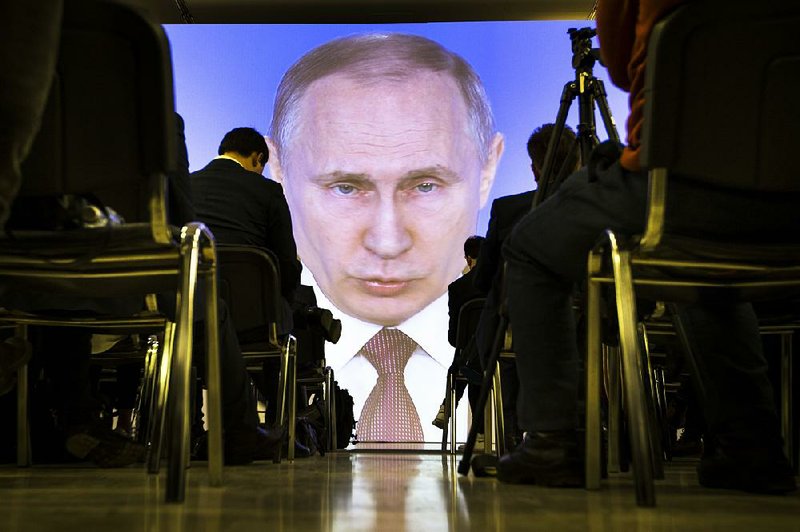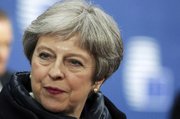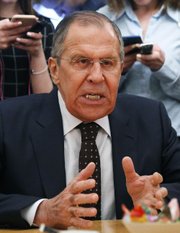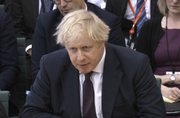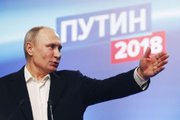British Prime Minister Theresa May has received widespread praise for the steely way that she has handled the attempted assassination of Sergei Skripal in the sleepy market town of Salisbury. Those accolades are exaggerated.
If anything, the British authorities reacted too fast and too furiously to the attack on Skripal, a former Russian military intelligence officer and convicted British double agent who was released from prison in 2010 in a spy swap that involved glamorous Russian sleeper agent Anna Chapman.
May was the home secretary who in 2014 authorized an inquiry into the November 2006 assassination of former FSB officer Alexander Litvinenko in London after having withheld permission in earlier years. Now, as prime minister, she predictably wants to show that she will stand up for the national interest. It's vital to be seen as strong, especially at a time when the daily headlines pillory her handling of Brexit negotiations with the European Union.
Westminster was bound to take stern measures, because a swapped spy is meant to have immunity from retaliation. To make matters worse, Skripal's innocent daughter as well as a local detective constable who went to their rescue were affected by the use of a chemical nerve poison on British soil.
But just as acting too quickly can backfire, it has always been counter-productive to act too late and too meekly. It's worth recalling that it took nine long years from the Litvinenko murder to the conclusion of the inquiry, which laid the blame on Russian intelligence officers Andrei Lugovoi and Dmitry Kovtun. The Litvinenko inquiry, after exhaustive proceedings, concluded that Russian President Vladimir Putin had "probably" given the order for his gruesome death by radioactive polonium-210 poisoning.
I served as an expert witness in that inquiry, and while I admired Judge Robert Owen's thoroughness, it is a pity than he felt unable to say more about the nature of the evidence that pushed him to point a damning finger at Putin. Perhaps he was placed under pressure by elements in the British government to restrain himself. Nobody knows.
What we do know, however, is that every Russian spokesman from Foreign Minister Sergei Lavrov on down has ridiculed the use of the word "probably" ever since,
and several Moscow newspapers that are usually capable of criticizing Putin followed suit.
The political handling of the Skripal poisoning has exposed the British Cabinet to the same treatment by Russian officials. This time Downing Street decided to condemn Putin without even bothering to put forward corroborating evidence.
Among the British population, there has been widespread distrust of governmental announcements ever since Tony Blair's manipulative statements that led to British involvement in the 2003 Iraq War. May's panicky accusations against Putin may soon prove to have a basis in fact, but it would have been wiser to lay out a trail of feasible suspicions and establish investigative arrangements that would more easily earn public trust at home and abroad.
Engagement with the Russian public matters if the West is ever to counter the popularity that Putin currently enjoys with most Russians. For an entire week after the Salisbury poisoning, Russian TV's Channel One carried commentaries ridiculing "Albion" for failing to take care of its Russian residents and rejecting British claims about Moscow's long arm of terror as yet another example of official Russophobia. In addition to making earnest demands for proof, the TV network as well as some Russian diplomats dropped hints that the attack on Skripal was a devilish plot by the British secret services to stir up hatred of Russia and disrupt its preparations for the June 2018 FIFA World Cup.
Most Russians obtain their news primarily from Moscow-based TV channels, which subserviently toe the Kremlin line. And the prime minister's total attribution of blame to Putin without publishing any evidence has played into the Kremlin's hands. The same was true of British Foreign Secretary Boris Johnson, who has a habit of scoring his own goals by saying the first thing that comes into his head.
Johnson hinted that the England soccer team might be withdrawn from participation in the World Cup. He repeated his display of idiocy by comparing Putin to Hitler, a highly insensitive comment in the minds of most Russians, who are united in the pride they take in the Soviet Union's role in defeating the Third Reich.
May's government has begun to recover from this shaky start. In the past, getting support for a robust diplomatic response from Washington and Brussels would have been guaranteed in advance. European anger about Brexit and the election of U.S. President Donald Trump, an admitted admirer of Putin, have made it less straightforward.
Trump has shown a reluctance to criticize the Russian leader even when various parts of his administration have enacted policies that run counter to Russian interests. Nevertheless, May succeeded in extracting a measure of support from Trump, and she and Johnson eventually found a sympathetic hearing among European leaders. They have welcomed inspectors from the Organisation for the Prohibition of Chemical Weapons and even persuaded the Trump administration and several European states to engage in a simultaneous large-scale expulsion of Russian diplomats.
Whether May and Johnson spoke more openly to U.S. and EU officials than they did in public about the evidence linking the poisoning to Putin still remains unknown. They would do themselves a favor if they were to discuss, however guardedly, the contours of the evidence they have collected.
When the Russian authorities make mischief by offering to assist in the investigation, the most effective response would be to accept the overture, share a sample of the poison, then subject the Kremlin's response to the same techniques of forensic exposure that Russians have been applying to British official announcements. It's true that this risks enabling Lavrov to pontificate and letting Russian news channel RT spread its propaganda. But Western democracies ought to have faith in their own resilience. Prolonged political transparency is more effective than sullen secretiveness; people have had enough of politicians who seek to preserve their privileged access to information that doesn't pose a danger for national security.
The Russian authorities have engaged in systematic hacking of the political process. They have interfered in elections. They have killed Russians abroad. Faced with such aggression, Western countries cannot retaliate in a straightforward fashion for practical and moral reasons, and Russia's entire political system is immune to external manipulation because the ruling elite predetermines the results of elections of decisive importance.
But there are other areas where Britain, the United States, and the EU have leverage.
The way to hit Russia where it hurts is to make clear to Putin that Russia's need for engagement with the West is much greater than the West's need for Russia. Already, members of the Russian ruling elite are subject to economic sanctions after the Magnitsky Act of 2012 and the measures introduced after the Russian annexation of Crimea in 2014. Not even the arrival in the White House of a friendly new president was enough to prevent ongoing sanctions. Both houses of the U.S. Congress are suspicious of any moves toward compromise with Moscow. Furthermore, Russian companies in strategic economic sectors have been precluded from raising funds from the banks of the United States and its allies.
Even Putin has admitted, through gritted teeth, that his country needs to be integrated into the global economy and to secure foreign direct investment. If Russia wants to sustain itself as a great power, it must become a serious technological power, and Russia's rulers know it.
By invading Crimea, a tiny morsel of territory compared to the vastness of the Russian Federation, Putin tossed away more than the opportunity to benefit from infusions of Western capital. The Crimean land grab also robbed Russia of the chance to act as a balancing force between America and China. Now, Beijing is able to call the shots in negotiations with Moscow. President Xi Jinping is vigorously pursuing Chinese ambitions, and the expansive Belt and Road Initiative to link China directly with Europe will cut through the ex-Soviet states in Central Asia that Moscow regards as its "near abroad." It is true that Putin and Xi have sponsored joint military exercises, but economic cooperation has disappointed the Russians. China always puts the Chinese national interest first.
When current diplomatic fireworks fade from view, Russia will need to start talking amicably to the Americans and the Europeans again. As things stand, Putin appears fairly confident about the path that he has chosen for Russia. But there are those in the Kremlin who dislike his recurrent provocations to Western public opinion. The decline of Russian economic growth is something that Russian rulers will eventually need to tackle through measures other than land grabs in the territories of the former Soviet Union.
Britain's success in persuading its closest allies to throw out some diplomats in solidarity with British anger isn't a sufficient response. The world's many other countries have yet to be convinced of May's position. That is more likely to be achieved if, instead of denouncing the appalling Putin at every opportunity, Britain presents the evidence as fully as it is safe to do and then shows the patience and firmness that this situation is going to require. We must be in it for the long haul.
Robert Service is a senior fellow at the Hoover Institution and emeritus professor of Russian history at Oxford University. He is the author of Last of the Tsars: Nicholas II and the Russian Revolution and Russia and its Islamic World: From the Mongol Conquest to the Syrian Military Intervention.
Editorial on 04/08/2018
